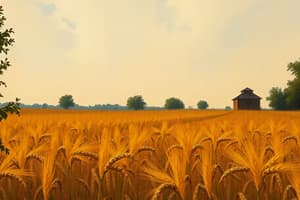Podcast
Questions and Answers
Name two legume crops that are important for grain cultivation.
Name two legume crops that are important for grain cultivation.
Peas, beans
What are some examples of leafy vegetables rich in vitamins and minerals?
What are some examples of leafy vegetables rich in vitamins and minerals?
Spinach, kale, collard greens, lettuce
Which type of crops provide essential carbohydrates, vitamins, and minerals and include examples like carrots and sweet potatoes?
Which type of crops provide essential carbohydrates, vitamins, and minerals and include examples like carrots and sweet potatoes?
Root crops
List three widely grown cereal crops that serve as staple foods.
List three widely grown cereal crops that serve as staple foods.
What do fruits and vegetables provide that are essential for a healthy diet?
What do fruits and vegetables provide that are essential for a healthy diet?
What are specialty crops and give an example?
What are specialty crops and give an example?
Explain the importance of industrial crops and provide an example.
Explain the importance of industrial crops and provide an example.
What is the difference between crop rotation and intercropping?
What is the difference between crop rotation and intercropping?
Name two examples of spices and herbs mentioned in the text.
Name two examples of spices and herbs mentioned in the text.
Why are nuts like almonds and walnuts enjoyed worldwide?
Why are nuts like almonds and walnuts enjoyed worldwide?
Flashcards are hidden until you start studying
Study Notes
Understanding Agriculture's Diverse Palette of Crops
The world's agricultural landscape is a tapestry of plant species, each contributing to our diets, economies, and cultural identities. Let's explore some of the key types of crops that shape this colorful ecosystem.
Grains
Grains are one of the oldest and most widely cultivated crops. They serve as a staple food for a significant portion of the global population, providing carbohydrates, fiber, and essential nutrients. Some of the most important grains include:
- Cereals: Wheat, barley, oats, rice, and corn are some of the most widely grown cereal crops. They are primarily used for human consumption and animal feed.
- Legumes: Peas, beans, lentils, and chickpeas are legume crops that make up an important part of grain cultivation. They're known for their high protein content and ability to fix nitrogen in the soil, improving its fertility.
Fruits and Vegetables
Fruits and vegetables are rich in vitamins, minerals, and fiber, making them essential components of a healthy diet. These crops can be grown in various climates and geographies, providing a vast array of taste and nutrient profiles.
- Root crops: Carrots, beets, potatoes, and sweet potatoes are all examples of root crops that provide essential carbohydrates, vitamins, and minerals.
- Leafy vegetables: Spinach, kale, collard greens, and lettuce are all leafy vegetables that are rich in vitamins, minerals, and antioxidants.
- Stem and bulb vegetables: Some vegetables like celery, asparagus, and onions grow from stems or bulbs. They provide essential nutrients and flavor to our diets.
- Fruits: Apples, bananas, oranges, and strawberries are among the many fruits that are enjoyed worldwide for their sweetness, flavor, and nutrition.
Specialty Crops
Specialty crops are non-traditional, high-value crops that include a diverse range of fruits, vegetables, and other plant-based products. These crops cater to unique tastes and preferences and contribute to the global food economy.
- Spices and herbs: Garlic, ginger, cinnamon, and mint are all spices and herbs that add flavor and aroma to our dishes.
- Nuts: Almonds, walnuts, cashews, and peanuts are all nuts that are enjoyed worldwide for their health benefits and unique flavors.
- Tea and coffee: Camphor, tea, and coffee are all examples of specialty crops that provide beverages with unique flavors and aromas.
Industrial Crops
Industrial crops are grown for their fibers, oils, and other non-food applications. These crops play a crucial role in supporting various industries and improving our quality of life.
- Cotton: Cotton is grown for its fibers, which are used to make textiles and other products.
- Flax: Flax is grown for its fibers, which are used to make textiles, as well as its seeds, which are used to make linseed oil.
- Soybeans: Soybeans are grown for their oil, which is used in a variety of products, and their protein-rich meal, which is used as animal feed.
Crop Rotation and Intercropping
To minimize the risk of crop failure, pest and disease outbreaks, and to improve soil fertility and structure, farmers often implement crop rotation and intercropping strategies. Crop rotation involves growing different types of crops on the same land in a cyclical pattern, while intercropping involves growing more than one crop in the same space. These practices help to maintain soil health, reduce environmental impacts, and increase crop yields.
Sustainable Agricultural Practices
Agriculture is a critical sector that impacts the environment, society, and our economy. To ensure a sustainable food future, it is important that agricultural practices are ecologically sound, economically viable, and socially responsible. This means considering the use of organic fertilizers, reducing water usage, employing conservation tillage practices, and promoting fair labor practices, among other strategies.
In conclusion, agriculture is a diverse and dynamic sector that enriches our lives and provides a variety of essential products. By exploring the different types of crops and understanding their unique characteristics, we can better appreciate the importance of agriculture in our daily lives and contribute to a more sustainable future.
Studying That Suits You
Use AI to generate personalized quizzes and flashcards to suit your learning preferences.




